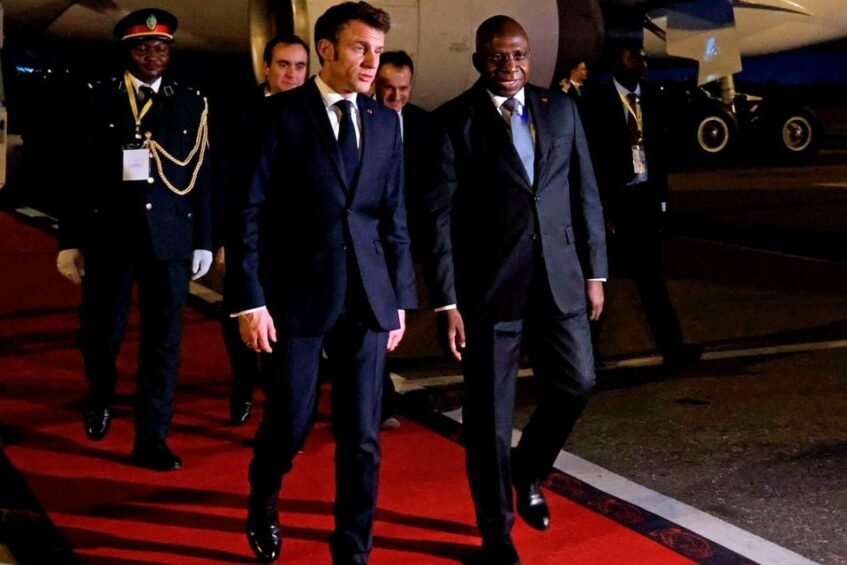You are here: Home | News | World News | Emmanuel Macron says era of French interference in Africa is ‘over’

French President Emmanuel Macron is greeted by a official upon arrival at arrives at Luanda International Airport in Luanda, Angola early on March 3, 2023. (Ludovic Marin | AFP).
President Emmanuel Macron on Thursday said the era of French interference in Africa was “well over” as he began a four-nation tour of the continent to renew frayed ties.
Anti-French sentiment runs high in some former African colonies as the continent becomes a renewed diplomatic battleground, with Russian and Chinese influence growing in the region.
Macron said France harboured no desire to return to past policies of interfering in Africa.
“The age of Francafrique is well over,” Macron said in remarks to the French community in the capital Libreville, referring to France’s post-colonisation strategy of supporting authoritarian leaders to defend its interests.
“Sometimes I get the feeling that mindsets haven’t moved along as much as we have, when I read, hear and see people ascribing intentions to France that it doesn’t have,” he added, ahead of an environment summit in Gabon the first leg of his trip.
“Francafrique” is a favourite target of pan-Africanists, who say that after the wave of decolonisation in 1960 France propped up dictators in its former colonies in exchange for access to resources and military bases.
Macron and his predecessors, notably Francois Hollande, have previously declared that the policy is dead and that France has no intention of meddling in sovereign affairs.
Macron on Monday said there would be a “noticeable reduction” in France’s troop presence in Africa “in the coming months” and a greater focus on training and equipping allied countries’ forces.
France has in the past year withdrawn troops from former colonies Mali, Burkina Faso and the Central African Republic.
The pullout from Mali and Burkina Faso, where its soldiers were supporting the Sahel nations to battle a long-running jihadist insurgency, came on the back of a wave of local hostility.
In his remarks on Thursday, Macron insisted the planned reorganisation was “neither a withdrawal nor disengagement”, defining it as adapting to the needs of partners.
These fields of cooperation included fighting maritime piracy, illegal gold mining and environmental crimes linked to regional drug trafficking, itself fuelled by a “terrorist movement” in the Lake Chad area, he said.
More than 3,000 French soldiers are deployed in Senegal, Ivory Coast, Gabon and Djibouti, according to official figures.
The proposed revamp concerns the first three bases but not Djibouti, which is oriented more towards the Indian Ocean.
Another 3,000 troops are in the Sahel region of West Africa, including in Niger and Chad.
Macron landed in Libreville on Wednesday and will later head to Angola, Congo-Brazzaville and the neighbouring Democratic Republic of Congo.
His comments came before several heads of state gathered for the One Forest Summit in Libreville, which tackled how to preserve rainforests that play a vital role in the global climate system.
The forests of the vast Congo River basin represent the planet’s second-largest carbon sink after the Amazon.
They are also home to huge biodiversity including forest elephants and gorillas, and bear traces of the settlement of early humanity.
But they face threats such as poaching, deforestation for the oil, palm and rubber industries, and illegal logging and mineral exploitation.
At the summit, Macron set out an action plan including 100 million euros for countries “to accelerate their strategy of protecting vital carbon and biodiversity reserves”.
Macron said he would seek to “put natural capital back at the heart of our economies”.
“We always speak of billions in our summits, but people see little of it on the ground because the systems are imperfect,” he said calling for countries that keep forests in tact to be compensated.
Other presidents expected to attend the summit are host Ali Bongo Ondimba of Gabon; Denis Sassou Nguesso of Congo-Brazzaville; Faustin-Archange Touadera of the Central African Republic; Chad’s Mahamat Idriss Deby Itno; and Teodoro Obiang Nguema Mbasogo of Equatorial Guinea.
The gathering kicked off on Wednesday with exchanges between ministers, civil society representatives and experts.
Macron heads to the former Portuguese colony of Angola on Friday, where he is set to sign an accord to develop the agricultural sector as part of a drive to enhance French ties with anglophone and Portuguese-speaking Africa.
He then stops in the Republic of Congo, another former French colony, where Sassou Nguesso has ruled for a total of almost four decades, and neighbouring Democratic Republic of Congo.
Support Eye Radio, the first independent radio broadcaster of news, information & entertainment in South Sudan.
Make a monthly or a one off contribution.
Copyright 2024. All rights reserved. Eye Radio is a product of Eye Media Limited.